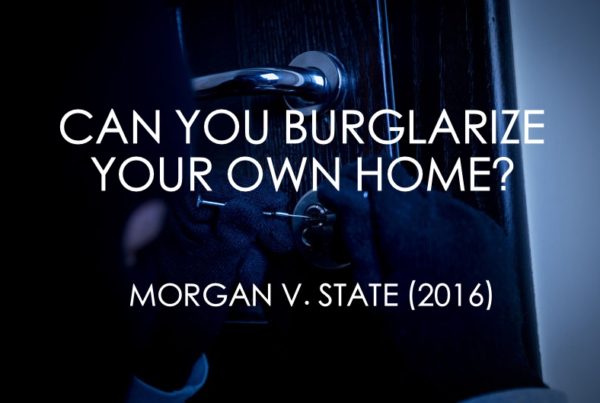Felony Murder Conviction is Affirmed on Appeal
 Gardner v. State (14th Court of Appeals, Houston 2015)
Gardner v. State (14th Court of Appeals, Houston 2015)
Herbert Gardner and his ex-girlfriend dated for four years and lived together in his ex-girlfriend’s home. When the couple broke up on November 2, 2012, Gardner moved into a hotel. On December 23, 2012, his ex-girlfriend was found murdered in her home and Gardner was found nearby, badly injured. On the way to the hospital Gardner stated to the police officer, “I should not have shot her.” A jury found Gardner guilty of an elevated charge of capital murder, and the trial court sentenced him to mandatory life in prison.
Gardner appealed to the Court of Appeals, arguing (1) that the evidence was insufficient to prove that he murdered his ex-girlfriend in the course of committing a burglary, an aggravating factor that elevates a murder charge to a capital offense with a heavier punishment; and (2) that the evidence was insufficient to prove that when he entered his ex-girlfriend’s home, he committed or intended to commit a felony, theft, or assault, which also carries a heavier punishment in Texas. The Court of Appeals disagreed with both of Gardner’s arguments, affirming his conviction.
First, the language of the statute under which Gardner was convicted states, “A person commits burglary if, without the effective consent of the owner, he: (1) enters a building or habitation with intent to commit a felony, theft or an assault, or, (2) enters a building or habitation and commits or attempts to commit a felony, theft or an assault.”
Gardner argued that he had an equal right to possession of the property and could not be found to have entered without his ex-girlfriend’s consent because he had lived in the home for four years, that the neighbors saw him in the home on a regular basis, and that he used the residence as home address on his driver’s license. The State argued that Gardner lost his right to possession before the murder because he moved into a hotel, his name was not on the property deed, that the front window of the home was broken and blood-stained with Gardner’s blood, that his vehicle registration reflected a different address, and that there were not any items that suggested a male was living in her home at the time of the murder.
In assessing the sufficiency of evidence, the Court of Appeals must view all evidence in the light most favorable to the verdict to determine whether the trial court could have found the elements of the offense beyond a reasonable doubt. Here, the Court of Appeals agreed with the State, that there was indeed sufficient evidence for a rational jury to conclude that Gardner no longer lived with his ex-girlfriend and no longer had consent to enter the home at the time of the murder. Because the evidence was sufficient to prove the unlawful entry element of burglary, the Court of Appeals overruled Gardner’s first argument.
Second, the language of the statute under which Gardner was convicted states, “A person commits capital murder if he intentionally or knowingly causes an individual’s death while in the course of committing or attempting to commit burglary.” Gardner argued that the State wrongly used his murder to establish the murder requirement for capital murder and to establish the felony component of the underlying burglary. The State argued that the Court of Criminal Appeals—the court of last resort for criminal matters in Texas— has held in several cases that a murder occurring after a break-in can indeed serve as both the basis for the murder charge and the underlying felony required for burglary.
Under the legal doctrine of Stare Decisis, courts must follow the precedent established by the higher court from cases the higher court has heard from previous years. In criminal appeals, these prior cases serve as an example for lower courts to follow when making decisions about upholding or overturning convictions. Here, the Court of Appeals overruled Gardner’s second argument because the court is bound to follow precedent set forth by the Court of Criminal Appeals. The State could use Gardner’s murder to establish the murder requirement for capital murder and to establish the felony component of the underlying burglary in order to elevate the murder to capital murder, which incurs a higher penalty in Texas.
In criminal appeals, the court is primarily responsible for ensuring that proper form and procedures are followed in the trial courts, rather than determining the facts of the case. The trial court is tasked with determining and recording the facts of the case, to be used later on appeal if necessary.
A criminal defense attorney in Fort Worth will understand the subtle nuances of the statutory language found in the Texas Code of Criminal Procedure and in legal doctrines, such as Stare Decisis. As you can see from the case above, statutory language and legal doctrine have a direct impact on establishing the elements of a crime, elements that may determine the severity of the penalty in the punishment phase of a trial. This essay does not replace legal counsel or advice.
Free Consultation with a Dedicated Team of Fort Worth Criminal Defense Attorneys
Barnett Howard & Williams PLLC is a proven and dedicated criminal defense law firm. With offices in Fort Worth, Keller, and Grapevine, our attorneys stand ready to defend your liberty and your future. Call our office at (817) 993-9249 to arrange a Free consultation of your criminal case today. Do not wait until it is too late.










